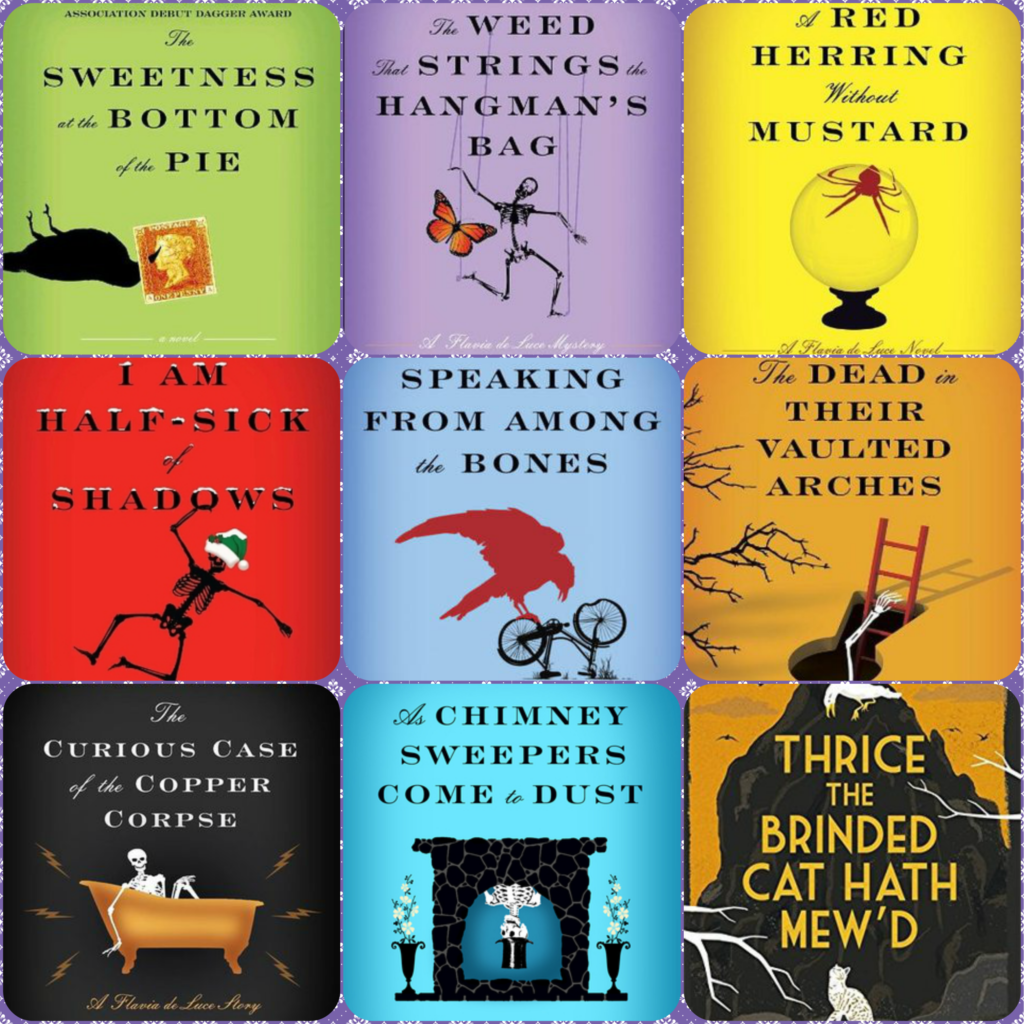The Flavia de Luce Series
A good friend and book barmy follower asked if I had read any in this series by author Alan Bradley. It took me a minute, but I remembered that, yes I have. I’ve read the first four, but somehow forgot all about them.
This is not a reflection on the books, which I thoroughly enjoyed, just a reflection on my age and sometimes poor memory. I also realized I never wrote about them here.
Let me tell you a bit about the heroine – Flavia de Luce is an eleven year-old girl, mature beyond her years, with an interest in all things chemistry-related, but with a special passion for poisons.
Let’s join Flavia as she mounts her trusty bicycle, Gladys, to solve a murder in the first in the series The Sweetness at the Bottom of the Pie.
It is the summer of 1950, and at the once-grand estate of Buckshaw, situated in the English countryside, Flavia is drawn into a series of inexplicable events: A dead bird is found on the doorstep, a postage stamp bizarrely pinned to its beak. Then, several hours later, she finds a man lying in the cucumber patch, as he takes his dying breath.
While she is both appalled and delighted, life begins in earnest when this murder comes to Buckshaw. When her widowed father is suspected and arrested for the crime, Flavia is soon trying to untangle the knots surrounding the stranger, a rare stamp, her father’s old schoolmaster, and the dead man in the garden.
I wish I could say I was afraid, but I wasn’t. Quite the contrary. This was by far the most interesting thing that had ever happened to me in my entire life.
She has many allies in her adventures with a variety of unlikely helpers and protectors. Flavia has to deal with her annoying older sisters, the dotty old housekeeper, her largely detached father and the intriguing and obviously inferior police inspector Hewitt. My favorite character (aside from Flavia) was the gardener and handyman, Dogger, who suffers from post traumatic stress syndrome and just wants to live a quite life but he has a special connection to the youngest De Luce.
The book (and the series that I’ve read) is filled witty intelligent writing.
It is not unknown for fathers with a brace of daughters to reel off their names in order of birth when summoning the youngest, and I had long ago become accustomed to being called ‘Ophelia Daphne Flavia, damn it.
Flavia is funny, and as I said earlier, quite mature for her age.
If there is a thing I truly despise, it is being addressed as ‘dearie.’ When I write my magnum opus, A Treatise Upon All Poisons, and come to Cyanide, I am going to put under “Uses” the phrase “Particularly efficacious in the cure of those who call one ‘Dearie.’
Flavia is also fearless and unflappable Turns out she is is a natural sleuth and is soon bothering everyone in the village to gain insight into the murder and clear her father’s name.
People love to talk–especially when the talking involves answering the questions of others–because it makes them feel wanted. […] I had long ago discovered that the best way to obtain answers about anything was to walk up to the closest person and ask.
The series can be labeled as cozy as there is minimal blood and gore, but there’s lots of action, red herrings and intriguing twists. The characters are so well-written that if you’re like me, you may begin to think of them as real people. I found it refreshing to see that our heroine was thrown off direction as readily as the reader. And this is the bonus – what makes this series stand out — the reader is seeing the world through an eleven year-old’s eyes which makes the story lines come alive.
I love Flavia; her intelligence mixed with mischief, her pluckiness and resourcefulness, her composure when encountering the morbid, and ultimately, how she accomplishes remarkable things while whiling away the long, solitary hours at the crumbling estate.
Mr. Bradley has beautifully captured the foibles of Flavia’s young age — her indignant need to be considered (at least) as capable as the adults around her, then in a different way, how small and lonely she feels when she wants to return to being a child, and doesn’t exactly know how to do it.
The Sweetness at the Bottom of the Pie won The Crime Writer’s Association Debut Dagger award and the Agatha Award for best first novel. And Marilyn Stasio, who reviews crime novels for The New York Times Book Review, included it as one of the best mysteries of the year.
The story goes, that after completing only fifteen pages of Sweetness, Mr. Bradley (within eight days) had secured book deals in three countries, not withstanding, this was his first attempt at writing a novel at 70 years of age.
So, Book Barmy followers, if you enjoy reading English countryside mysteries, without excessive violence, but are looking for something more than a typical comfort read – how about a most unusual detective, great writing, humor, and a unruly amount of knowledge about poisons — treat yourself to this wonderful series. I’m putting number five on my list.
N.B. In case you’re wondering about the titles, Mr. Bradley frequently borrows lines from canonical English poems which he often quotes before the title page







